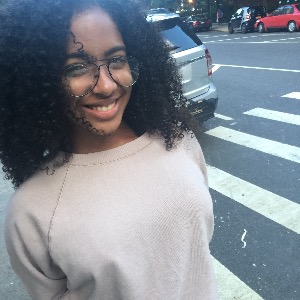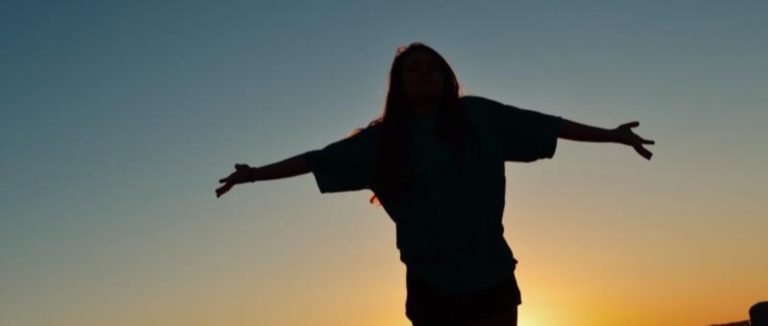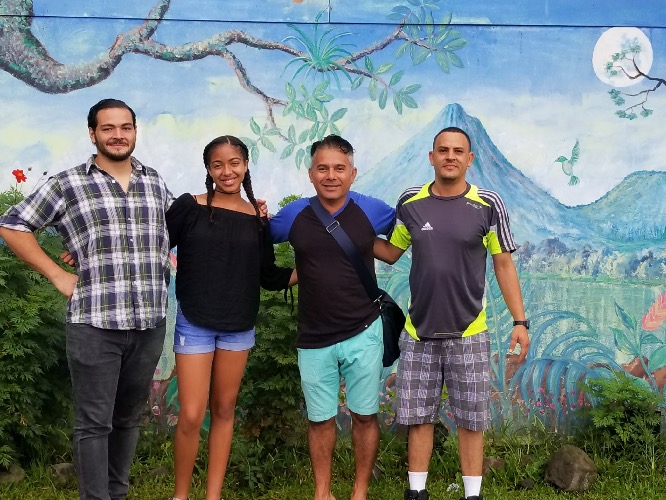This post features Raevin S., the Grand Prize Winner of this year’s weShare project competition. weShare is EF’s personalized learning experience, designed to encourage students to share their travel stories and highlight the unique things that sparked their curiosity on tour. Each year, EF’s judging panel awards students across the country who go above and beyond with their projects. Raevin won the grand prize of a free spot on an upcoming EF tour.
 Meet Raevin: she defines herself as an aspiring globetrotter who wants to learn about other cultures and a believer in love, kindness, and equality for all people. When she’s not swimming or drawing, you’re likely to find this 14-year-old chasing after her dog, Marley, or dancing with her younger sister to Michael Jackson.
Meet Raevin: she defines herself as an aspiring globetrotter who wants to learn about other cultures and a believer in love, kindness, and equality for all people. When she’s not swimming or drawing, you’re likely to find this 14-year-old chasing after her dog, Marley, or dancing with her younger sister to Michael Jackson.
She had traveled to Jamaica to visit family a few times, but Raevin’s EF tour to Costa Rica was her first trip to Latin America. As tour approached, she was preparing in a “traditional” sense—buying mosquito repellent and looking up Costa Rican customs—when she came across an email from her teacher about weShare. Taking a deeper look, she realized that this might be the perfect opportunity to explore a topic she truly cared about while she was traveling. Little did she know she would return to Charlotte, North Carolina with a new outlook and eventually win a free tour for her thoughtful and creative take on women’s roles.
Finding Inspiration
Upon discovering Costa Rica had elected a female president, Laura Chinchilla, in 2010, Raevin was intrigued and kept researching to find out more. She learned that prior to President Chinchilla being elected, Costa Rica had introduced laws that mandated women fill at least 40 percent of the country’s electable positions. To her, seeing such a strong female presence was something she “always had known was possible,” but it filled her with more hope “knowing that it had happened somewhere else.” As she continued to compare government involvement in women’s rights between the US and Costa Rica, she noted that “[the] U.S. isn’t there yet” compared to the strong efforts Costa Rica was making to represent women.
There was plenty to learn online about the important contributions Costa Rican women have made to society. From the government to the national fútbol team, the country seemed to be teeming with strong ladies. However, Raevin noticed that the voice of Costa Rican women was missing from her story. It was then she knew she had found the lens with which she would view her trip: “How does the role of women differ throughout the country of Costa Rica? And how does that compare to the role of women in the United States?” What better way to find this out than travel to Costa Rica and ask the women herself?
 Interviews and Discoveries
Interviews and Discoveries
On tour, her question came to life as Raevin stretched beyond her comfort zone to find answers. She boldly faced the intimidating, took full advantage of her language immersion tour, and struck up conversations in Spanish with the women she met. Raevin wanted a mosaic of female voices to comprise her project. It was tricky for her to keep up with their Spanish as they spoke “very quickly,” but she was determined to understand them and take steps towards her goal of becoming a fluent Spanish speaker. With a little help from her tour director, she learned that “each woman gave [her] a different kind of story of how women are treated.” They gave their perspectives on issues Raevin experiences growing up as a young woman in America such as stereotyping, body image issues, and sexism.
In Guanacasta, she spoke with an agriculturalist who persevered after being told science is too difficult for women and she should give up her studies. This sentiment of strength was shared by the salsa instructor she interviewed in the Sarapique region. This woman used salsa dance to celebrate the strong bodies of Costa Rican women while casting away the machismo ideal. The optimism that there are endless opportunities available to young women growing up in Costa Rica today was a common thread. Raevin continued in search of answers about the everyday lives of women, asking everyone from an English teacher to a local cheese maker. All of these women stressed to Raevin the importance of holding on to their jobs and identities while still being the backbone of their households. Hearing this invoked in her “a sense of pride in seeing how powerful and strong women are, even though they might not get all of the credit they deserve all of the time.”
Even the youngest of women were inspirations to Raevin. One of the highlights of her trip was the day her group visited a local elementary school. It was there Raevin met some of the phenomenal young women of Costa Rica’s future. One moment that really stood out to her was when “this one little girl came up to me and she just hugged me,” she said. “We were just playing together and I thought that was just beautiful.” This kindness was something that followed Raevin throughout her Costa Rican adventure and a gift she knew she wanted to carry with her when she returned home.
 Reflecting Back Home
Reflecting Back Home
Raevin’s exploration of how women work, govern, and nurture felt life-changing. She observed that women do it all: “even though women continue to attain higher goals, they remain the backbone of the family by holding onto traditional roles.” Raevin recognizes the issues facing women and girls today such as machismo culture, and struggles with body image. But she remains “confident that great strides will continue to be made around the world because of the phenomenal women of the past, present, and those to come in the future!”
Now that she is home, surrounded by the “wonderful, strong, and beautiful” women of her family, Raevin recognizes that “great and inspirational women are not limited to one country.” She looks to strong women all over, from her mother, a lawyer, to Maria Elena Valverde, a founding member of the Costa Rican national women’s soccer team. They remind her that “women will persevere, no matter what the country is; women will be strong.” That strength is something she intends to embody as she grows into her own life as a woman.
Related articles
